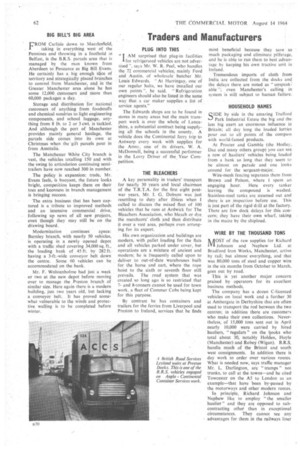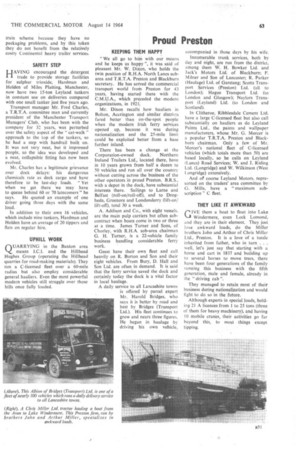Traders and Manufacturers
Page 64

Page 65

If you've noticed an error in this article please click here to report it so we can fix it.
PLUG INTO THIS AM surprised that plug-in facilities
1 for refrigerated vehicles are not advertised ". sa.,s Mr. W. R. Peel, who handles the 72 commercial vehicles, mainly Ford and Austin, of wholesale butcher Mr. Louis Edwards. "At Harringay, one of our regular halts, we have installed our own points ", he said. "Refrigeration engineers should also be listed in the same way that a car maker supplies a list of service agents."
The Edwards shops are to be found in stores in many areas but the main transport work is over the whole of Lancashire, a substantial contract being supplying all the schools in the county, A vehicle does the Continental ferry trip to Antwerp every week with supplies for the Army, one of its drivers, W. A. McDonnell, being a successful performer in the Lorry Driver of the Year Competition.
THE BLEACHERS A key personality in traders' transport for nearly 30 years and local chairman of the T.R.T.A. for the first eight postwar years. Mr. 1. G. Dobson was just resettling to duty after illness when 1 called to discuss the mixed fleet of 100 vehicles that be runs at Ardwick for The Bleachers Association, who bleach or dye the merchants' cloth and then distribute it over a vast area, perhaps even arranging for its export.
His own organization and buildings are modern, with pallet loading for the flats and all vehicles parked under cover, but operations are a mixture of ancient and modern; he is frequently called upon to deliver to out-of-date warehouses built for the horse and cart, where the rope hoist to the sixth or seventh floor still prevails. The road system that was created so long ago is so restricted that 7and 8-tonners cannot be used for town work, a fleet of Cornmer Cobs being kept for this purpose.
By contrast he has containers and trailers for the ferries from Liverpool and Preston to Ireland, services that he finds most beneficial because they save so much packaging and eliminate pilferage, and he is able to run them to best advantage by keeping his own tractive unit in Ireland.
Tremendous imports of cloth from India are collected from the docks and the delays there are noted as " unspeakable "; even Manchester's calling in system is still subject to human failure.
HOUSEHOLD NAMES Q1DE by side in the amaring Trafford Park Industrial Estate the big and the less big exert an enormous influence in Britain; all day long the loaded lorries pour out to all points of the compass with world-famed products.
Ai Procter and Gamble (the Hedley, Daz and many others group) you can see. a row of hauliers' vehicles being loaded from a bank so long that they seem to be almost on parade and one looks around for the sergeant-major.
Wire-mesh fencing separates them from Bro_wn and Poison, where I spent art engaging hour. Here every tanker leaving the compound is washed. Stainless-steel tanks are steamed out and there is an inspection before use. This is just part of the rigid drill at the factory. There are few dock delays for this concern; they have their own wharf, taking in the maize by the shipload.
WIRE BY THE THOUSAND TONS MOST of the raw supplies for Richard IV-1 Johnson and Nephew Ltd. at Bradford Iron Works, Manchester, arrive by rail; but almost everything, and that was 80,000 tons of steel and copper wire in the six months from October to March, goes out by road.
This is yet another major concern praised by operators for its excellent business methods.
The company has a dozen C-licensed vehicLes on local work and a further 30 at Ambergate in Derbyshire that are often used to transport the rod between the two centres; in addition there are customer.; who make their own collections. Nevertheless, of 15,000 tons sent out in April nearly 10,000 were carried by hired hauliers, " regulars " on the looks who total about 30, notably Holden, Hoyle (Manchester) and Robey (Wigan). B.R.S. handle. much of the Bristol and south west consignments. In addition there is day work to order over various routes. What is needed now, says traffic manager Mr. L. Darlington, are " tramps " not trunks, to call at the towns—and he cited Towcester on the AS to London as an example—that have been by-passed by the motorways and other modern routes.
In principle, Richard Johnson and Nephew like to employ "the smaller haulier" and they are opposed to subcontracting other than in exceptional circumstances. They cannot see any advantages for them in the railways liner train scheme because they have no packaging problems, and by this token they do. not benefit from the relatively costly Continental heavy trailer services.
SAFETY STEP
HAVING encouraged the detergent trade to provide storage facilities for sulphur trioxide, Hardman and Holden of Miles Platting, Manchester, now have two 15-ton Leyland tankers in constant use on deliveries compared. with one small tanker just five years ago.
Transport manager Mr. Fred Charles, a T.R.T.A. committee man and currently president of the Manchester Transport Managers' Club, who has been with the company for 32 years, was perturbed over the safety aspect of the " cat-walk " approach to the top of the tankers, so he had a step with handrail built on. It was not very neat, but it impressed people, so the idea was developed and a neat, collapsible fitting has now been evolved. .
Mr. Charles has a legitimate grievance over dock delays: his dangerous chemicals rate as deck cargo and have therefore to be last-day loads. " Yet when we get there 'we may have to queue behind 60 or 70 latecomers" he
says. He quoted an example of one driver going three days with the same load.
In addition to their own 16 vehicles, which include nine tankers, Hardman and Holden have an average of 20 tippers and flats on regular hire.
UPHILL WORK
QUARRY1NG in the Buxton area means IC.!. and the Hillhead Hughes. Group (operating the Hillhead quarries for road-making materials). They run a C-licensed fleet over a 60-mile radius but also employ considerable general hauliers. Even the most powerful modern vehicles still struggle over those hills once fully loaded.




















































































































